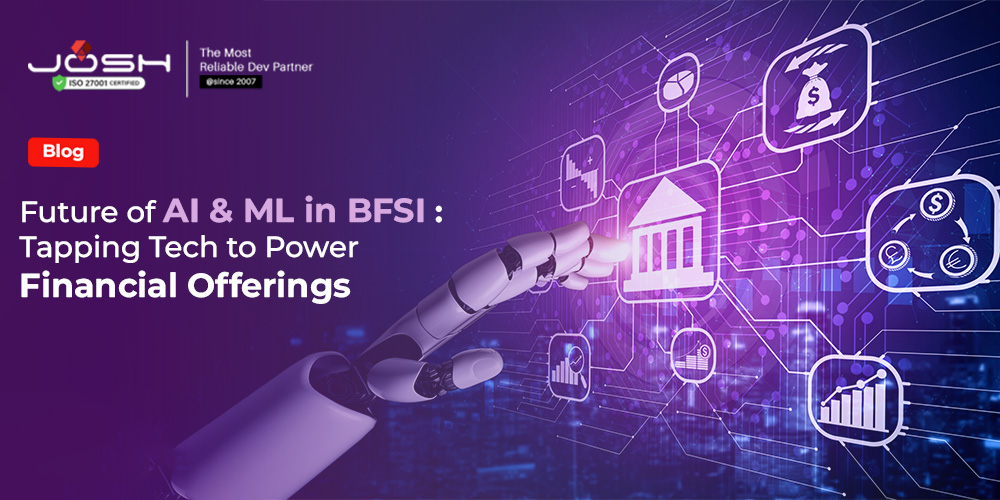“By 2030, the market for AI and advanced machine learning in the BFSI sector is expected to be worth USD 61.24 billion, expanding at a CAGR of 23.1% between 2021 and 2030.”
The financial sector is experiencing a turning point. The COVID-19 pandemic has accelerated the trends of technological disruption and consumer behavior change, which are laying the groundwork for a revolution in banking business models.
Long hampered by antiquated systems, the banking and financial services industry (BFSI) is ready for a technological overhaul. And as the crisis unfolded, it became the primary catalyst for the immediate need to adopt digital-first initiatives.
The continued development of AI and ML technologies within BFSI services builds on this trend, giving financial institutions the chance to boost revenue at lower costs through novel methods of customer engagement and service.
Reasons Driving the AI & ML Adoption

Businesses run a significant risk of losing ground to competitors if they don’t adopt and scale artificial intelligence and machine learning into their operations. However, for a while now, the BFSI sector has been buzzing with talk of utilizing AI and ML for financial services in a variety of ways. The entire sector has undergone a radical transformation as a result of the aforementioned technological advancements.
To cut down on mistakes, speed up deliveries, and improve efficiency, credit processing, contract review, and risk assessment are some of the top priorities of industry stakeholders performed through the use of AI/ML technologies.
For banks and financial services, the time is ripe to adopt AI & ML-powered solutions in order to achieve meaningful human interactions and streamline business processes.
Exploring the Applications of AI/ML in BFSI
The pandemic massively triggered the demand for AI and ML services — with many banking and financial institutions tapping their capabilities to bring forth individualized customer-focused offerings. Jotted down are some of the groundbreaking AI and ML applications coming out of the sector:
Redefining Customer Engagement/Experience
While most of the banking industry is jumping on the artificial intelligence and machine learning bandwagon, some institutions are still reluctant to use these technologies to better connect with their customers and provide them with exceptional service and experiences. Regardless, there has been a sharp increase in the number of financial institutions taking the digital route to improve customer experience across mobile and web channels.
Artificial intelligence (AI) bots, aided by machine learning and NLP, have streamlined and simplified the digital banking process. Some examples of how they can be put to work to better the customer-banker relationship are as follows:
- Hassle-free onboarding process
- Round-the-clock customer support
Enhancing Credit Scoring Assessment
Existing credit scoring models are largely antiquated. Their decision-making abilities are heavily influenced by a presumptive customer base, including factors like demographics, age, marital status, etc. Without substantial prior information, credit may be denied to otherwise qualified borrowers.
Rather than relying solely on a borrower’s past behavior to determine their creditworthiness, AI-driven credit scoring analyzes their current and future earning potential, taking into account factors such as their salary and length of employment. Credit scoring based on AI is well-equipped to deal with economic uncertainty and consistently provides accurate results.
Process Streamlining with Robotic Process Automation

Incorporating intelligent process automation, machine learning has the potential to do away with a large portion of the menial labor currently performed by humans. Automating paperwork, gamifying employee training, and other mundane tasks are just a few examples of how the introduction of RPA with AI/ML into banking is making life easier for everyone involved. Through these measures, banks and other financial institutions can better serve their customers, cut costs, and increase their range of services.
While AI-backed RPA necessitates extensive employee training, structured inputs, and governance, once successfully implemented it can fully take over the majority of banking operations. Listed below are some of RPA’s sector-wide impacts:
In automatic report generation
Producing Suspicious Activity Reports is a standard for the BFSI. Traditionally, the involved parties like the compliance officers had to sift through records to process the documents. Fast-forward to today, with the integration of RPA’s language processing model, intelligent bots help banks generate reports without having to file for SARs.
In the onboarding process
Banks have recently begun deploying RPA bots powered by artificial intelligence to assist with KYC processes. Therefore, banks can swiftly extract relevant information from customer documents and use the bots to forward onboarding cases requiring human intervention to a bank officer.
A notable automation example is JPMorgan Chase, the largest bank in the United States, which sought to automate away the time its loan officers spent on routine tasks like interpreting commercial-loan agreements. In order to save 360K hours per year processing documents, the bank implemented Contract Intelligence (COIN), an automated system for contract processing and data extraction.
Parting Words
For many financial institutions, the widespread adoption of artificial intelligence technologies is no longer a matter of choice but rather a crucial business imperative. As a result, we are seeing a sea of financial service players turning to service providers for assistance in areas such as artificial intelligence and machine learning, specifically in legacy modernization, data science, and system integration.
Get in touch with our team of BFSI specialists and speed up your digital transformation today!

